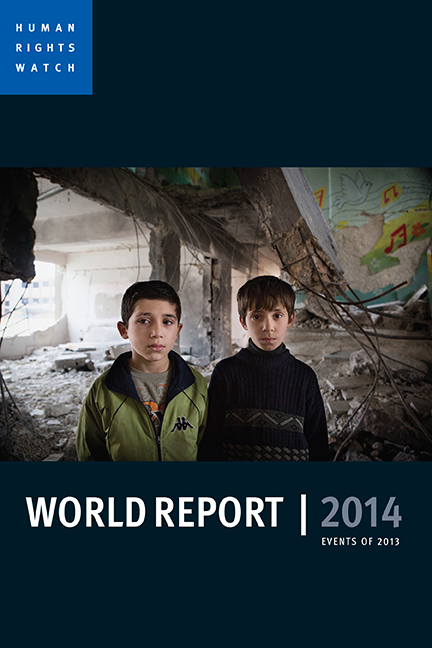Book contents
- Frontmatter
- Dedication
- HUMAN RIGHTS WATCH
- Table of Contents
- Foreword
- Rights Struggles of 2013: Stopping Mass Atrocities, Majority Bullying, and Abusive Counterterrorism
- The Human Rights Case for Drug Reform How Drug Criminalization Destroys Lives, Feeds Abuses, and Subverts the Rule of Law
- Putting Development to Rights: Integrating Rights into a Post-2015 Agenda
- The Right Whose Time Has Come (Again) Privacy in the Age of Surveillance
- Photo Essays
- AFRICA
- AMERICAS
- ASIA
- EUROPE AND CENTRAL ASIA
- MIDDLE EAST AND NORTH AFRICA
- UNITED STATES AND CANADA
- 2013 HUMAN RIGHTS WATCH PUBLICATIONS
- Acknowledgments
- Frontmatter
- Dedication
- HUMAN RIGHTS WATCH
- Table of Contents
- Foreword
- Rights Struggles of 2013: Stopping Mass Atrocities, Majority Bullying, and Abusive Counterterrorism
- The Human Rights Case for Drug Reform How Drug Criminalization Destroys Lives, Feeds Abuses, and Subverts the Rule of Law
- Putting Development to Rights: Integrating Rights into a Post-2015 Agenda
- The Right Whose Time Has Come (Again) Privacy in the Age of Surveillance
- Photo Essays
- AFRICA
- AMERICAS
- ASIA
- EUROPE AND CENTRAL ASIA
- MIDDLE EAST AND NORTH AFRICA
- UNITED STATES AND CANADA
- 2013 HUMAN RIGHTS WATCH PUBLICATIONS
- Acknowledgments
Summary
Uncertainty over the organization of long-delayed parliamentary elections, envisioned to consolidate Guinea's full transition from authoritarian to democratic rule, dominated the political and human rights landscape and led to a worrying increase in violence in 2013. Months of violent protests involving militants from the opposition, the ruling party, and the security services left dozens dead and over 400 wounded.
Parliamentary elections, not held since 2002, were to have taken place six months after the largely free and fair 2010 election of Alpha Conde as president. However, they were repeatedly delayed by opposition demands to address technical concerns involving the electoral list and the right of the diaspora to participate, among other issues. The delay exacerbated ethnic tensions, deepened a concentration of power in the executive branch, and generated considerable frustration within Guinean civil society and the country's international partners.
The vote finally took place on September 28 but, according to Guinean and international observers, it was marred by organizational problems and irregularities including ballot stuffing by supporters of the ruling party, voter intimidation, and minors casting votes.
Endemic corruption, the chronically neglected judiciary, and the slow pace of security sector reform undermined respect for the rule of law. Rising ethnic tensions ignited political violence and led to communal clashes in the N’Zérékoré region in July, which left at least 98 dead and 160 wounded.
Excessive use of force by security forces in response to political demonstrations declined, but they were nevertheless implicated in numerous incidents of excessive use of lethal force and unprofessional conduct as they responded to the violent clashes between militants of opposing political parties. Attacks against freedom of the press increased in 2013.
Guinea made some progress in ensuring accountability for past atrocities, including the 2009 massacre of unarmed demonstrators by security forces, and indictment of a few powerful political and military figures for the 2010 torture of members of the political opposition. There was little progress in attempts to establish a reconciliation commission and an independent human rights body.
International actors—notably the United Nations Office of West Africa (UNOWA), European Union, France, the United States, and the Organisation internationale de la francophonie (OIF)—took proactive steps to resolve disputes over the organization of parliamentary elections, but rarely spoke out on the need for justice for past and recent crimes by state actors.
- Type
- Chapter
- Information
- World Report 2014Events of 2013, pp. 124 - 128Publisher: Bristol University PressPrint publication year: 2014



